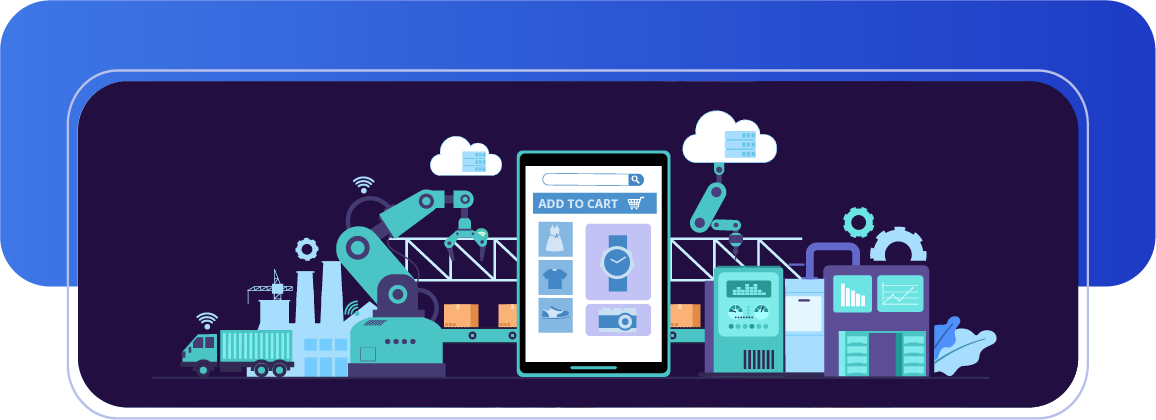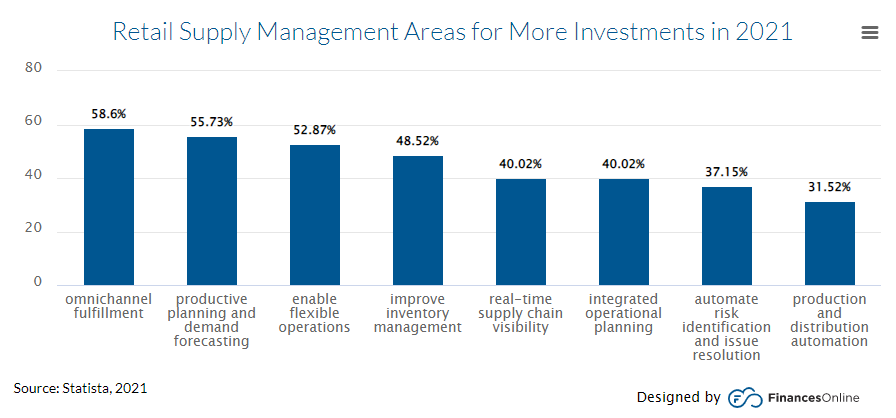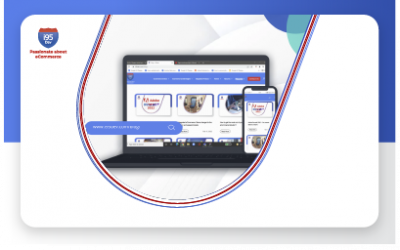Six key benefits of integrated eCommerce for manufacturing industry

It is apparent that eCommerce has changed the retail industry forever. Now, it is changing the manufacturing industries too. Therefore, manufacturing firms must adapt by developing and implementing eCommerce strategies and tools into their day-to-day operations. An integrated eCommerce solution can benefit manufacturing industries greatly in terms of revenues, market share, and long-term opportunities.
Most of the manufacturers have eCommerce plans in progress. According to a PwC survey, 66% of US manufacturers agree that implementing digital marketing and integrated eCommerce strategies is either a high or topmost priority over the next few years.
Why are manufacturing companies adopting integrated eCommerce at such a fast rate?
The answer is simple – It is benefiting them on a large scale!
We have listed the six key benefits of integrated eCommerce for the manufacturing industry:
#1 Enhanced Efficiency
 Integrated eCommerce provides manufacturers with the efficiency to automate huge-volume order processing and connect directly to accounting, inventory, and logistics for seamless, accurate fulfillment across every channel. It helps manufacturers save time by updating online catalogs and cross-checking data thoroughly.
Integrated eCommerce provides manufacturers with the efficiency to automate huge-volume order processing and connect directly to accounting, inventory, and logistics for seamless, accurate fulfillment across every channel. It helps manufacturers save time by updating online catalogs and cross-checking data thoroughly.
An integrated eCommerce ecosystem enables customers to order online from anywhere and at any given time. In addition, it helps manufacturing organizations to focus on and improve significant customer services such as shipping costs, timely shipping, and more. An error-free shipping process makes the order flow smooth and increases sales by manifolds. Moreover, the insights drawn from the increased business efficiency allow manufacturers to design better marketing campaigns and tap potential customers.
#2 Ensures faster time to market

In current times, speed is the essential element for your business’ profitability. When you have the right integrated eCommerce solution in place, you will discover that getting your products to market is faster than otherwise. To begin with, you can acquire valuable insights into market trends that will help you develop your new product accordingly and at a faster pace.
With integrated eCommerce, you can centralize your data, systems, and processes, eliminating siloed operations, redundant processes, and duplicated data. In other words, you can quickly access the exact information needed to launch your products without any delay.
#3 Ensures visibility and accessibility to spare parts
More often than not, businesses in the manufacturing industry have a high demand for spare parts. It is the apt space to cash on. However, the challenge faced is searching for and matching the spare parts with the customers’ requirements.
An integrated eCommerce store allows you to match these spare parts with the complex products customers have bought. The customers do not have to take the pain of searching for connecting parts. As a result, cross-selling and upselling become pretty easy. By ensuring clear visibility and easy accessibility to spare parts, manufacturing companies can take customer experience to the next level and improve their bottom line.
#4 Boost sales with supply chain integration
Supply disruption has cost a fortune to many companies in the manufacturing sector, especially during the Covid-19 pandemic. Considering the recent turn of events, overcoming supply chain challenges translates to capturing the market. Manufacturing companies can meet their customers’ requirements and market demands by implementing a successful eCommerce supply chain. It enables them to increase scalability resulting in new market segments, potential partners, and sales channels.
According to Statista, 2021:
- 48.52% want to enhance inventory management
- 40.02% want to invest in real-time supply chain visibility
- 40.02% want to enhance integrated operational planning

The aforementioned three requirements can be achieved through integrated eCommerce!
An integrated eCommerce solution with a supply chain integration helps boost sales by discovering new markets and expanding product lines. Furthermore, the direct connection with buyers ensures higher profit margins. Additionally, it leads to product innovation since manufacturers can come in contact and interact with a broader audience and prospects.
#5 Production capacity decisions
The production capacity of a manufacturing company deals with output and how it balances raw materials, labor, machinery, and storage to match the demand for its products. Decisions taken about production capacity are critical. They have to be well thought out, strategic, and operational for both the short and long run.
An integrated eCommerce solution can give the manufacturer valuable insights, including what the target audience is searching for online and the standard products being bought. This data helps a great deal in making new company decisions, brand development, finalizing product lines and formulating competitive pricing.
#6 Running effective marketing campaigns through data analysis
Data-driven marketing campaigns have been a hot topic lately. As big data grows rapidly, companies have access to myriads of data at their disposal. Today 64% of marketing experts agree that data-driven marketing is critical for success in the manufacturing industry. However, just a handful of manufacturing companies use the collected data to produce effective creative campaigns.
Integrated eCommerce provides the platform for manufacturing companies to carry out a data analysis campaign. With the help of integrated eCommerce, manufacturers and distributors can gauge and analyze the effectiveness of campaigns for marketing, inventory turns, customer sales, and customer engagement. Moreover, manufacturing industries can use this data to make better and more informed business decisions.
Looking for a futuristic integrated eCommerce solution to scale your manufacturing business?
Recent Blogs
Enhancing Shipping Precision with Custom Shipping Groups in Adobe Commerce/ Magento
Enhancing Shipping Precision with Custom Shipping Groups in Adobe Commerce/ Magento Author Category Share Three things matter the most when it comes to eCommerce shipping: speed, accuracy,...
Managing Massive Product Catalogs: Why Synchronization is the Key to Efficiency
Managing Massive Product Catalogs: Why Synchronization is the Key to Efficiency Author Category Share The automotive aftermarket industry is vast and highly competitive, requiring businesses...
A Complete Guide to Seamlessly Integrating Adobe Commerce with NetSuite
A Complete Guide to Seamlessly Integrating Adobe Commerce with NetSuite Author Category Share Integrating Adobe Commerce (formerly Magento) with NetSuite ERP can transform the way businesses...



